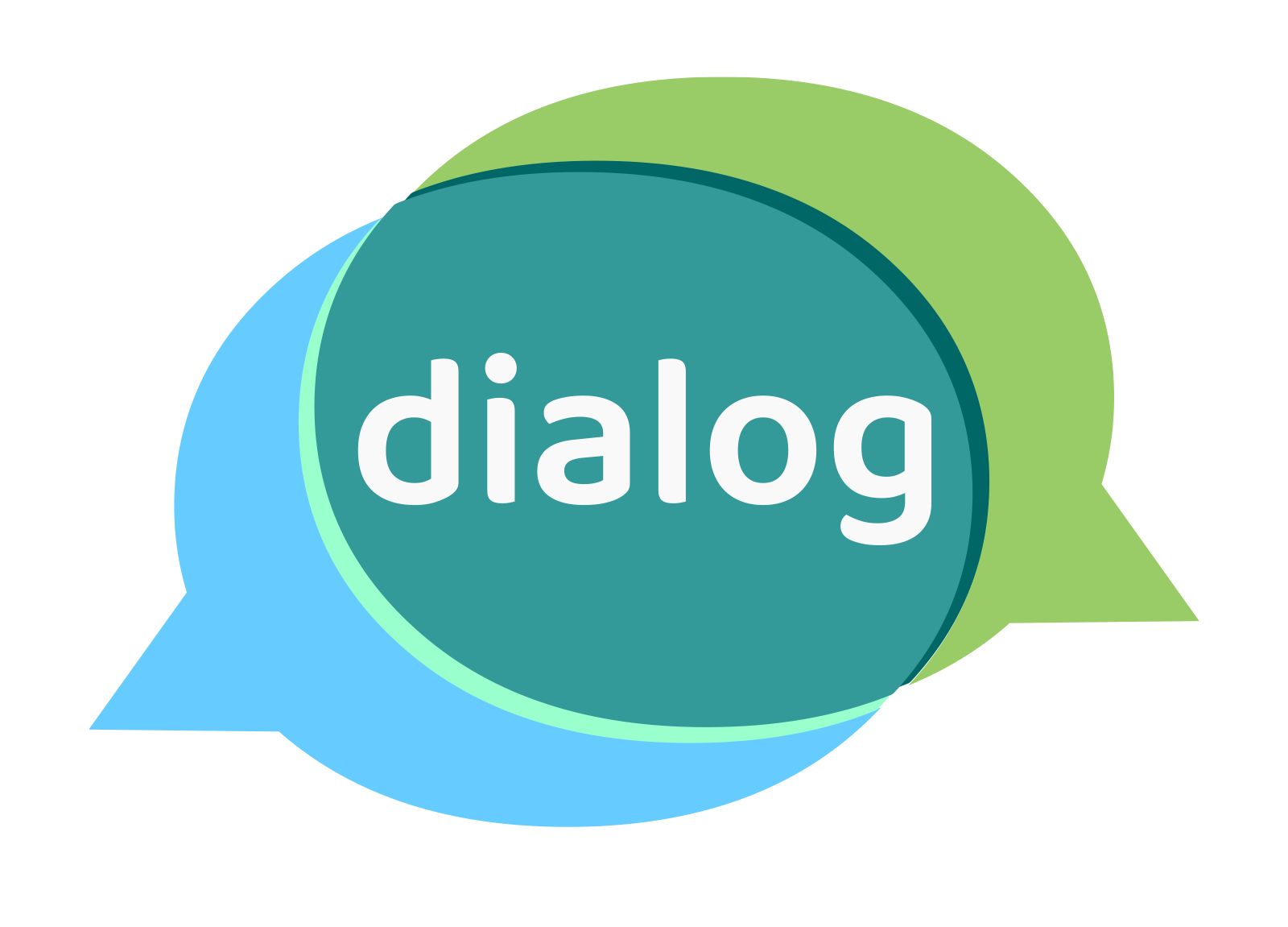ChatGPT & Google, SMB Outperformers, News Search, AI HR 'Outsourcing'

For Now: ChatGPT & Google
Similarweb posted data on reciprocal usage among ChatGPT and Google audiences: "95.8% of ChatGPT users visited Google, while 9.8% of Google users visited ChatGPT" over the past 12 months. The Google→ChatGPT number is probably low, but the ChatGPT→Google number is consistent with our consumer data and reflects an emerging, complementary usage pattern. Growing numbers of people start their search/discovery process on ChatGPT and then turn to Google to navigate to websites, read reviews, get directions or other information not readily available on ChatGPT. This is especially prevalent in local. Because Google's local graph is superior, people are doing local searches on ChatGPT (65%) and then going to Google for "last mile" information. In a broader context, Google AI Overviews can partly be seen as an effort to keep from losing the top of the funnel. We've also observed a shift among AI users from weekly to daily engagement. Among more engaged AI users, we now see fewer "no change" answers in response to the question "how AI has impacted your Google search usage?" No change dropped by six points since November. Paradoxically, more people are using Google both more and less than in November. Similarweb asserts that some people are shifting from Google to ChatGPT as their "primary tool." That's happening for sure for some. But, at least in local, it's a more complicated story.
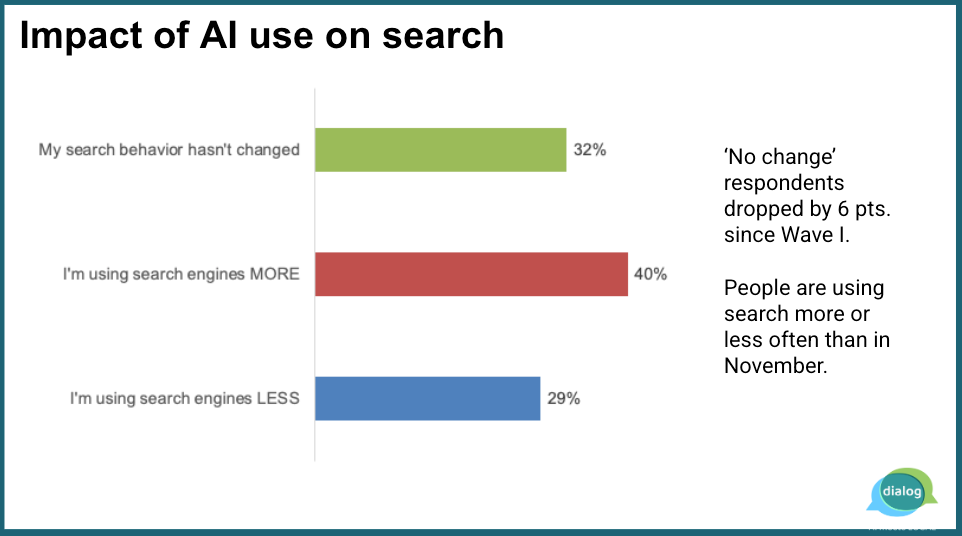

Survey: AI SMBs Outperforming Peers
Late last year, we found that roughly 39% of small businesses (SMBs) were using AI for marketing and sales (78%), product/service development (39%), customer service (24%), operations and logistics (19%), job descriptions and training (14%), and billing/payment analysis (8%). According to US Bank’s 2025 survey, 36% of SMBs (n=1K, 99 or fewer headcount) are using AI for content creation (44%), data analysis/market insights (41%), marketing and sales (39%) and multiple other use cases, such as customer support (35%), software recommendations (33%), supply chain forecasting (29%) and resume screening (28%). Interestingly, more than two-thirds of business owners are spending less than $50 per month on AI tools (unnamed in the survey) and almost 20% are using free versions. US Bank found there were few distinctions between younger owners and Boomers in their adoption patterns. One of the primary benefits reported by 88% of respondents is that AI enables them to spend more time with customers. AI adopters are also more optimistic and rate themselves as more successful than their non-AI-using peers. Are they more successful because of AI or have they adopted AI because they recognize its value, which helps them be more successful? There are concerns too, however: 81% say keeping up with AI is stressful, 58% feel pressured to use AI more, and 56% worry their services could be replaced by automation.
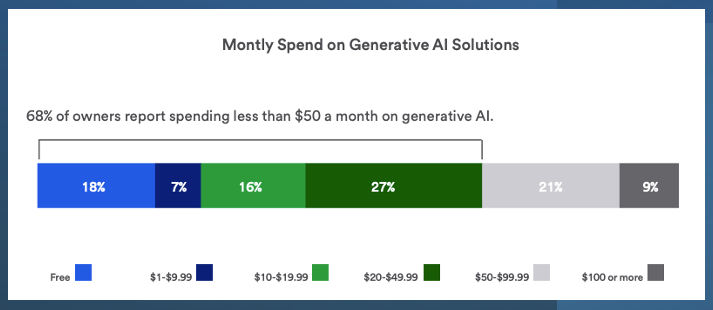

News Lookups Show Search Shifts
According to new data from Similarweb, news-related searches on ChatGPT are growing by triple digits while news searches on Google have declined. Of course the volume of news search on Google is orders of magnitude greater than on ChatGPT. But the change hints at a broader shift in search behavior. According to Similarweb, "Between January 2024 and May 2025, news-related prompts in ChatGPT rose by 212%, while equivalent Google searches declined by 5%." The analytics firm also documents that since the launch of Google AI Overviews (AIOs), in early 2024, zero-click news searches have grown "from 56% to nearly 69%" and corresponding traffic to news sites has declined "noticeably." This parallels other categories, where people are getting "answers" from AIOs and not visiting the underlying sources of that information. In Dialog's consumer research 91% of Google users, who'd seen AIOs (72%), found them useful and helpful. The growth of news-related search on ChatGPT is a microcosm of broader search trends, reflecting that users are migrating from Google for certain kinds of lookups.
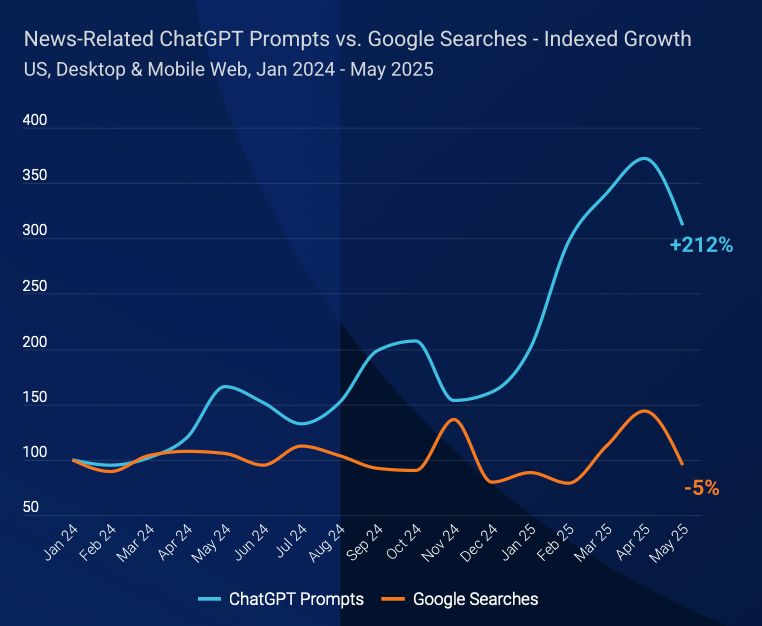

AI Deciding Who's Hired, Fired
Personnel decision-making in organizations is often cumbersome and fraught. A new survey from Resume Builder shows how a growing number of bosses and managers are dealing with it: outsource to AI. The survey (n=1,342 US "managers" in companies with 11+ employees) has some shocking--if not surprising--findings. In the survey sample, 65% of respondents said they use AI in their jobs and 94% of them are using AI to make hiring, promotion and firing decisions. ChatGPT is the most commonly used tool (53%), then Microsoft Copilot (29%) and finally Gemini (16%). These managers are using AI for a range of personnel-related tasks including training. Most also use AI to decide who gets a raise (78%), a promotion (77%) or who gets laid off (66%). In roughly 20% of cases, there's no human oversight of any of this. And only a third of respondents received any formal training on the ethical use of AI in personnel management. The rest are seemingly winging it. Finally, almost half (46%) of the respondents using AI were asked to decide whether AI could replace any of their direct reports. More than half (57%) decided "yes" and 43% actually did replace people with AI. Even if you see this as simply "directional" and not representative of US workplaces as a whole, it's still pretty disturbing.
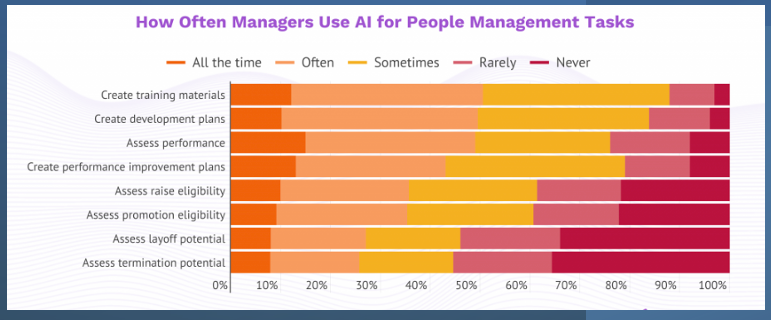

AI Shifting Workplace Power Dynamics
During COVID and shortly thereafter, tech companies and many traditional employers tried to show new levels of "empathy" for employees with remote work policies and other benefits. There was also a hiring boom and lots of competition for talent. In-demand workers had considerable bargaining power. Fast forward to today, power has dramatically shifted back to bosses amid numerous rounds of tech layoffs – Microsoft just laid off 9K last week, following 6K in May. But AI has also contributed to the power shift. A couple of weeks ago, Amazon CEO Andy Jassy matter-of-factly said that the company would use AI to reshape its workforce and that it would simply need fewer people going forward. His tone was deceptively neutral but other employers have celebrated the substitution of workers with AI (see Klarna, Duolingo). And Anthropic's CEO warned of a "white collar bloodbath." Whatever his motives, the de facto impact is to boost the power of employers. Some CEOs are using the combined threat of layoffs and AI substitution to keep snarky workers on the back foot, as they say in the UK, or to quell employee dissent (see Meta). Many people at tech companies have been cowed into silence for fear of being branded a "low performer" and stack-ranked out of a job. Only in the fierce competition for AI talent do employees till retain substantial power.


Everything Else
- Meta and Anthropic's "fair use" AI victories aren't quite what they seem.
- EU to proceed with AI rules timeline, ignoring calls for a "pause."
- AI traffic about 1%; blocking AI training bots not impacting AI visibility.
- AI medical diagnostic tool significantly outperformed MDs alone.
- Teachers saving six weeks per year with AI, but struggling with student usage.
- Upwork study reveals complex impact of AI on jobs and industries.
- New AI wedding planner takes aim at human consultants.
- State AI regulation ban failed, new national effort begins.
- The massive privacy problems baked into agentic AI.
- AI notetakers increasingly standing in for humans in online meetings.
